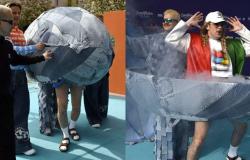
Maria Montessori has created a unique method of pedagogy, based on the idea of free and natural education, whose main goal is the child’s development. The so-called Montessori method is widely used in educational institutions all over the world, including in Latvia. Maria Montessori paid special attention to children with physical and mental developmental disabilities, during her lifetime these children were called the little idiots, as we learn in the feature film.
The work of director Lea Todorova is a feminist costume drama, the action of which begins in 1900, when a famous courtesan Lily (played by the popular French actress Leila Behti) goes from Paris to Rome to hide her daughter Tina, who was born with developmental disabilities and became a a hindrance to Lily’s career. In Rome, the courtesan meets the doctor Maria Montessori (played by the Italian movie star Jasmīne Trinka), a woman who was one of the first in Italy to receive a medical education. “When I started studying, it was unthinkable that a woman could practice medicine,” says Maria. For several years, Marija has been developing an innovative educational system for children with special needs. “It is training rooted in love that allows us to prepare these children for the primary school exam,” adds Maria.
Maria Montessori herself also has a secret – an illegitimate child born in a relationship with her colleague, child psychologist Giuseppe Montezano. They work together at the Institute of Medicine and Pedagogy, but Giuseppe feels strong competition from Maria and accuses her of selfishness and ambition. Later it becomes known that Maria’s research and practical work at the institute is not paid at all, only Giuseppe receives a salary.
Actress Jasmīne Trinka plays Maria as an independent, brave woman who is confident in her abilities and her mission. She is stubborn at times. Maria does not want to get married, because she considers marriage a form of slavery, she does not want to be anyone’s property. According to her, marriage hinders a woman’s professional and intellectual development and subjects her to the will of her husband. Maria even allows the following idea: if women chose their partners after gaining economic independence, men would be forced to improve!
The film has many melodramatic twists to make it interesting to the widest possible audience, not just children’s education professionals. The film tells about female friendship and mutual support: thanks to Maria’s efforts, the courtesan’s daughter develops her abilities, while the courtesan convinces Maria not to be afraid to sell her ideas, to be a hero and a leader, to be attractive, charming and successful. Parisian Lily’s charm, energy and talent for attracting patrons (in this case – the wives of wealthy men who are ready to donate funds to noble causes) help Maria realize her dream of a revolution in pedagogy and open her first school, which will operate using the Montessori method.
The movie Maria Montessori introduces one of the most outstanding women of the 20th century, who has defended the rights of women and children and changed the system of child development and education. The filming process has been special for director Lea Todorova, as she is also raising a daughter with developmental disabilities.
Tags: Feminist costume drama great personality Maria Montessoris life story big screen Day





